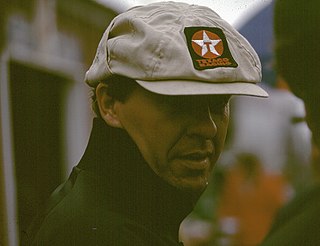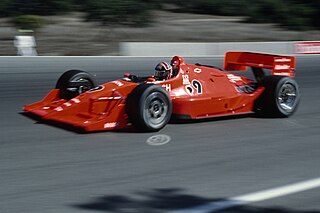
Alfred Unser was an American automobile racing driver, the younger brother of fellow racing drivers Jerry and Bobby Unser, and father of Al Unser Jr. He was the second of four men to have won the Indianapolis 500 four times, the fourth of five to have won the race in consecutive years, and the winner of the National Championship in 1970, 1983, and 1985. The Unser family has won the Indy 500 a record nine times. He was the only person to have both a sibling (Bobby) and child as fellow Indy 500 winners. Al's nephews Johnny and Robby Unser have also competed in that race. In 1971, he became the only driver to date to win the race on his birthday.
Teodorico Fabi is an Italian former racing driver. He competed in Formula One, IndyCar, and sports car racing. He claimed pole position in his rookie year at the 1983 Indianapolis 500. Teo is the older brother of former Formula One driver Corrado Fabi.

Roberto José Guerrero Isaza is a Colombian-American former race driver. He participated in 29 Formula One Grands Prix, debuting on 23 January 1982, becoming the first Colombian to start a Formula One Grand Prix.

Danny Ongais was an American racing driver.
Theodore Racing was a Formula One constructor from Hong Kong founded by real estate magnate and millionaire Teddy Yip. They participated in 51 Grands Prix, entering a total of 64 cars.
Gordon Johncock is an American former racing driver. He won the Indianapolis 500 twice, and was the 1976 USAC Marlboro Championship Trail champion.
John Kevin Cogan is a former race car driver who drove in Formula One from 1980 to 1981. Driving a RAM Williams in the 1980 Canadian Grand Prix, he failed to qualify, suffering the same result driving for Tyrrell at the 1981 US GP West. He then moved over to Indy cars in 1982 but his career was cut short by a series of accidents.

Robert Buddy Lazier is an American auto racing driver, best known for winning the 1996 Indianapolis 500 and the 2000 Indy Racing League season championship.

Thomas Edsol Sneva is a retired American race car driver who won the Indianapolis 500 in 1983. He primarily raced in Indy cars, and was named to the Motorsports Hall of Fame of America in 2005.
Chaparral Cars was a pioneering American automobile racing team and race car developer that engineered, built, and raced cars from 1963 through 1970. Founded in 1962 by American Formula One racers Hap Sharp and Jim Hall, it was named after the roadrunner, a fast-running ground cuckoo also known as a chaparral bird.

Everette Edward Carpenter, Jr. is an American auto racing driver, currently competing in the IndyCar Series for his team, Ed Carpenter Racing. He is the stepson of Indy Racing League founder Tony George.

Bill Alsup was an American race car driver. He was the first Championship Auto Racing Teams (CART) Rookie of the Year in 1979 and competed in the 1981 Indianapolis 500, finishing 11th. He made 57 CART & USAC Champ Car starts in his career. His best race finish of third came 3 times and he was the 1981 CART Championship runner-up, putting in a winless but consistent season for Penske Racing, his only effort with a top-level team. He returned to his own team the next year and struggled until leaving Champ Car following the 1984 Sanair Super Speedway race.

Duane Claude Carter Jr., nicknamed "Pancho," is an American retired open-wheel racing driver. Best known for his participation in Championship car racing, he won the pole position for the 1985 Indianapolis 500, and won the Michigan 500 in 1981.

The 1980 CART PPG Indy Car World Series season was the second in the CART era of U.S. open-wheel racing. It consisted of twelve races, beginning in Ontario, California on April 13 and concluding in Avondale, Arizona on November 8. The PPG Indy Car World Series Drivers' Champion and Indianapolis 500 winner was Johnny Rutherford. Rookie of the Year was Dennis Firestone. The entire season, including the 64th Indianapolis 500, was to be co-sanctioned by both the USAC and CART under the banner of the Championship Racing League (CRL). However, USAC withdrew from the arrangement after five races.
The 1983 CART PPG Indy Car World Series season was the 5th national championship season of American open wheel racing sanctioned by CART. The season consisted of 13 races. Al Unser was the national champion, and the rookie of the year was Teo Fabi. The 1983 Indianapolis 500 was sanctioned by USAC, but an arrangement was made such that it counted towards the CART points championship. Tom Sneva won the Indy 500, after three previous runner-up finishes.
The 1985 CART PPG Indy Car World Series season was the 7th national championship season of American open wheel racing sanctioned by CART. The season consisted of 15 races. Al Unser Sr. was the national champion, and the rookie of the year was Arie Luyendyk. The 1985 Indianapolis 500 was sanctioned by USAC, but counted towards the CART points championship. Danny Sullivan won the Indy 500, in dramatic fashion, a race that became known as the "Spin and Win."
The 1988 CART PPG Indy Car World Series season was the 10th national championship season of American open wheel racing sanctioned by CART. The season consisted of 15 races, and one non-points exhibition event. Danny Sullivan was the national champion, winning for Team Penske. The rookie of the year was John Jones. The 1988 Indianapolis 500 was sanctioned by USAC, but counted towards the CART points championship. Rick Mears won the Indy 500, his third victory at Indy.

The Penske PC-10 is a CART open-wheel race car, designed by Penske Racing, which was constructed for competition in the 1982 season. Designed by Geoff Ferris, it is considered possibly the most dominant Penske race car design ever and that from a team that typically dominated. Rick Mears has been quoted as acknowledging this was his favorite racecar chassis ever. Twelve total were made (1-12), six raced by Penske (1-6), with four confirmed destroyed. They were manufactured at Penske Cars, Ltd. in Poole, England during 1982, and delivered to Penske Racing, Inc., in Reading, Pennsylvania. So outstanding was the PC-10's design, it won the prestigious Louis Schwitzer Award for innovation and engineering excellence in the field of race car design at the Indianapolis 500 in 1982. The PC-10s were active in the years 1982–1984. In fact, the PC-10 was ultimately much better than the following year PC-11, so Roger Penske bought back one of the PC-10s he had sold to another team for the 1983 season, and which then won another race for his team.

Vince Granatelli Racing was an American auto racing team that competed in the CART PPG IndyCar World Series between 1987 and 1991.
Alex Morales Motorsports was a racing team active in sprint cars and Indycars for several decades. The sprint car team won multiple championships between the 1950s and 1990s while their Indycar team was active from 1975 to 1989, winning three races. The team was owned by California businessman Alex Morales who sponsored the team with his Alex Foods brand in the earlier years and was managed by chief mechanic John Capels, who later served on CART’s board of directors.











